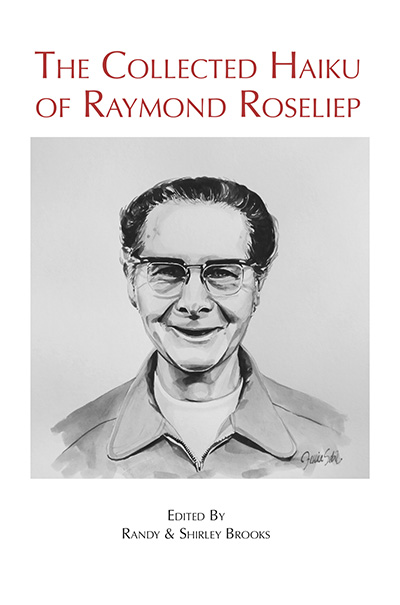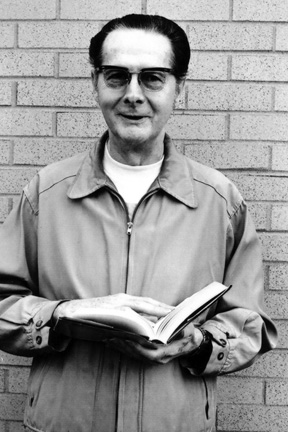The Collected Haiku
|

ISBN: 978-1-929820-15-3 ORDER Directly from Brooks Books Brooks Books Or order this book by credit card online: |
PDF Edition Orders: Due to the expense of shipping a clothbound book to international addresses, Brooks Books is pleased to offer a PDF edition of this book. The price for the PDF edition is the same as the print edition, but this saves international customers the $25 postage cost. ORDER the PDF edition from Brooks Books Please use the following PAYPAL button for this order: |
International Cloth Edition Orders: Brooks Books can ship the cloth edition to international customers willing to pay the $25 postage cost. A few countries cost up to $35, but we keep the postage cost charge to $25. ORDER the clothbound edition from Brooks Books for a 20% WEBSITE DISCOUNT of $32.00 pluls $25 shipping = $57 USD total. Please use the following PAYPAL button for this order: |
| the bee stops singing. we find who we are |
hole in my sock letting spring in |
|
rabbit in the moon |
gone through a moon |
downpour: |
children leap- |
The Collected Haiku of Raymond Roseliep Brooks Books is publishing the Collected Haiku of Raymond Roseliep as a clothbound library edition. This will make his entire life’s work available to readers and collectors. It will be published in a format that is expected for library holdings. Donors of $100 or more contributing toward the hefty publication cost of this extensive collection will receive a copy of both the The Collected Haiku of Raymond Roseliep and 100 Haiku for 100 Years: A Celebration of Raymond Roseliep, until all copies are gone. Patron donors will also receive a 50% discount on additional copies of the collected haiku to donate copies to libraries or to give to friends.
|
|
This Haiku of OursAn excerpt from Raymond Roseliep’s “This Haiku of Ours,” published as a letter to the editors in Bonsai: A Quarterly of Haiku in 1976, pages 11-20. Dear Jan and Mary, Since 1963 I've been working with haiku—reading Japanese haiku of all ages in translation as well as varieties of haiku by American and English writers, studying articles and books about this exquisite formation, and of course writing haiku, ranging from classical /traditional on through vastly experimental kinds. Although my theory and practice are both in a healthy state of flux, I'd like to set down some of my present thought. Marveling at how we've done splendid, audacious things with the sonnet in transporting it from Italian shores into the mainstream of our poetry, I'm heartened to reflect on possibilities for haiku. I believe we are preserving the quintessence of haiku if we do what the earliest practitioners did: use it to express our own culture, our own spirit, our own enlightened experience, putting to service the riches of our land and language, summoning the dexterity of Western writing tools. The most obvious way we can begin to make haiku more our property is to exploit our fabulous native tongue. English can be as musical as only a poet knowing the keyboard can make it, or as cacophonous as he may wish to make it too. Within our miraculous sound system we have cadences, rhythms, measures, movements, stops, pauses, rimes (!). We possess a gigantic vocabulary—and oh what we can do with words when we arrange them! Since phrasing is vital to haiku, our supple American idiom stands ready for achieving any effect desired, and waits only the hand of the poet to manage it. For subject matter we should dig into our own teeming country, God's plenty when it comes to materials: outer space discoveries, hairy youth, mini-skirts, bell bottoms, roller skates, pizza, peanut butter, saucer sleds, circuses, our enormous bird-fish-animal-&-insect kingdoms, our homeland flowers-trees-plants-grains-vegetables-&-fruits, motorcycles, ships that plow the sky and deliver people to Japan—the storehouse is without walls. Practically everything under the sun is valid subject matter for haiku as for any poem, except that in haiku it is the affinity between the world of physical nature and the world of human nature that concerns us. and so we focus our images there. It's American images I'm advocating rather than the Japanese cherry blossoms, kimonos, rice, tea, temple bells, Buddhas, fans, and parasols that populate so many supposedly Western haiku; something is not quite right when our poems come out sounding like Eastern poems. Creation is still more exciting than imitation. ~ Raymond Roseliep |
|
|
Television news interview with Editor Randy Brooks onWCIA (Champaign-Urbana, Illinois) for the Haiku Society Merit Book Award for 2018. |
|
